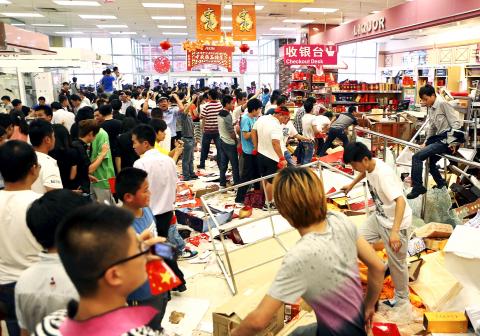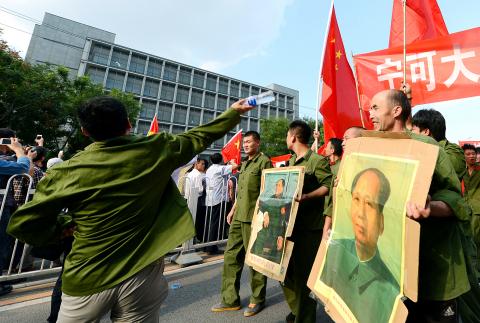Angry demonstrators attempted to storm the Japanese embassy in Beijing yesterday, state media said, as tens of thousands of people across China protested against Japan over a growing territorial dispute.
Riot police armed with batons and shields struggled to contain the swelling crowd outside the embassy, where witnesses said at least 2,000 people had gathered, some of them throwing stones and plastic bottles at the building.
A mob attempted to break into the embassy compound, but were stopped by armed police, Xinhua news agency said. It estimated the crowd at several thousand at its peak.

Photo: Reuters
Meanwhile, there were online reports that protests were staged in at least a dozen cities across China, with Japanese-built cars and Japanese restaurants being attacked by angry crowds.
Japanese media estimated 40,000 people took part in the protests nationwide.
On China’s Sina Weibo (新浪微博), a microblog similar to Twitter, images were posted of protests in Chongqing and Kunming.

Photo: AFP
Rallies were reported in several other places, including Nanjing, Xian and Taiyuan.
Much of the information about the protests posted online appeared to have been removed by the afternoon by China’s army of Internet censors — suggesting that Beijing is aiming to stop the row from spiraling further out of control.
The protests also did not feature on regular news bulletins on the state-run China Central Television.
The rumbling territorial dispute reached a new level this week, when Japan announced that it had bought islands in the East China Sea that it administers and calls the Senkaku Islands. The islands are also claimed by Taiwan, where they are called the Diaoyutai Islands (釣魚台), and China, where they are called the Diaoyu Islands.
Six Chinese ships sailed into waters around the archipelago on Friday, with Beijing saying they were there for “law enforcement,” leading Tokyo to summon the Chinese ambassador to protest what it insisted was a territorial incursion.
In the Chinese capital, where there have been large anti-Japan demonstrations for the past few days, roads were cordoned off and a helicopter hovered overhead, monitoring the embassy protest.
Nearby Japanese restaurants, which were all closed, appeared not to have been targeted by the angry crowds, but some protesters had draped Chinese flags over them.
Police monitored other demonstrations across China.
In Shanghai, police threw a security ring around the Japanese consulate, but allowed groups of protesters to approach the compound for short periods.
Scores waved Chinese flags, chanted slogans such as “Little Japanese” and held up signs insisting the islands were Chinese.
Police confiscated their signs and banners at the conclusion of the protest.
China and Japan are Asia’s two biggest economies with close trade and business ties. However, the relationship is often tense due to the territorial dispute and Chinese resentment over historical issues.
A Japanese diplomat said on Friday that Tokyo had issued a safety warning to its citizens in China after six “serious” cases of assault and harassment, all in Shanghai.

PREPAREDNESS: Given the difficulty of importing ammunition during wartime, the Ministry of National Defense said it would prioritize ‘coproduction’ partnerships A newly formed unit of the Marine Corps tasked with land-based security operations has recently replaced its aging, domestically produced rifles with more advanced, US-made M4A1 rifles, a source said yesterday. The unnamed source familiar with the matter said the First Security Battalion of the Marine Corps’ Air Defense and Base Guard Group has replaced its older T65K2 rifles, which have been in service since the late 1980s, with the newly received M4A1s. The source did not say exactly when the upgrade took place or how many M4A1s were issued to the battalion. The confirmation came after Chinese-language media reported

The Taiwanese passport ranked 33rd in a global listing of passports by convenience this month, rising three places from last month’s ranking, but matching its position in January last year. The Henley Passport Index, an international ranking of passports by the number of designations its holder can travel to without a visa, showed that the Taiwan passport enables holders to travel to 139 countries and territories without a visa. Singapore’s passport was ranked the most powerful with visa-free access to 192 destinations out of 227, according to the index published on Tuesday by UK-based migration investment consultancy firm Henley and Partners. Japan’s and

A Ministry of Foreign Affairs official yesterday said that a delegation that visited China for an APEC meeting did not receive any kind of treatment that downgraded Taiwan’s sovereignty. Department of International Organizations Director-General Jonathan Sun (孫儉元) said that he and a group of ministry officials visited Shenzhen, China, to attend the APEC Informal Senior Officials’ Meeting last month. The trip went “smoothly and safely” for all Taiwanese delegates, as the Chinese side arranged the trip in accordance with long-standing practices, Sun said at the ministry’s weekly briefing. The Taiwanese group did not encounter any political suppression, he said. Sun made the remarks when

BROAD AGREEMENT: The two are nearing a trade deal to reduce Taiwan’s tariff to 15% and a commitment for TSMC to build five more fabs, a ‘New York Times’ report said Taiwan and the US have reached a broad consensus on a trade deal, the Executive Yuan’s Office of Trade Negotiations said yesterday, after a report said that Washington is set to reduce Taiwan’s tariff rate to 15 percent. The New York Times on Monday reported that the two nations are nearing a trade deal to reduce Taiwan’s tariff rate to 15 percent and commit Taiwan Semiconductor Manufacturing Co (TSMC, 台積電) to building at least five more facilities in the US. “The agreement, which has been under negotiation for months, is being legally scrubbed and could be announced this month,” the paper said,